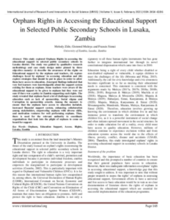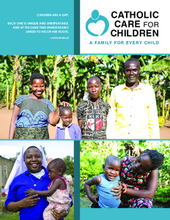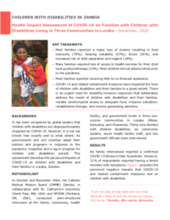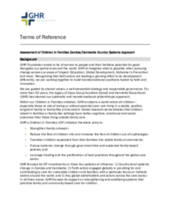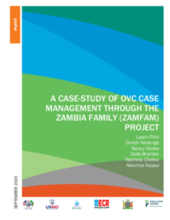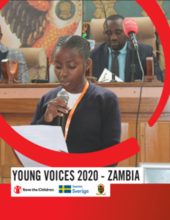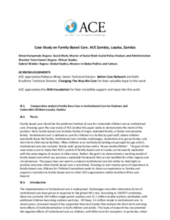childrens_living_arrangement
children_living_without_bio
Displaying 41 - 50 of 158
According to this article from the Global Sisters Report, "Catholic sisters in three African nations — Uganda, Zambia and Kenya — are leading the way in creating new models for caring for children."
This study explored Orphans Rights in accessing the educational support in selected public secondary schools in Lusaka district.
Catholic Care for Children (CCC) is a visionary initiative, led by Catholic sisters, to see children growing up in safe, nurturing families. Guided by the biblical mandate to care for the most vulnerable and animated by the principles of Catholic Social Teaching—especially the dignity of each person—CCC teams are reducing the need for institutional care by encouraging and facilitating family- and community-based care for children.
Catholic Medical Mission Board Zambia (CMMB), SPOON, and St. Catherine's University conducted this Health Impact Assessment (HIA) in Lusaka Province, Zambia, to understand the disparate impact that COVID-19 and the containment measures had on children with disabilities and their families. his two-phased assessment is designed to gather evidence about the impact through seven domains: COVID-19 knowledge and practices, food consumption, housing and livelihood, child safety and risk of separation, child health and wellness, parental and child stress, and education.
GHR Foundation is seeking a consultant/firm to conduct an assessment of the Children in Families (CIF) initiative country-level systems approach to strengthening holistic child protection systems in Zambia and Cambodia.
This case study was employed to understand actors, perceptions and document best practices by the ZAMFAM program, a project aimed at improving the care and resilience of vulnerable populations while supporting HIV epidemic control in Zambia.
This report’s primary purpose is to recommend evidence-based strategies to improve the relevance and effectiveness of field interventions that target development outcomes for migrant girls in Southern Africa.
This exploratory research led by Kindernothilfe between May – July 2020 shows how the challenges facing working children and their families have been exacerbated since the outbreak and it presents their recommendations for effective and relevant responses to the pandemic.
The Young Voices survey was conducted primarily to establish the level of children’s awareness about their rights and understanding what critical issues they face in terms of their rights.
The goal of this case study is to demonstrate a working model of family-based care in Zambia which can produce a replicable framework that can be modified for other regions and circumstances.

